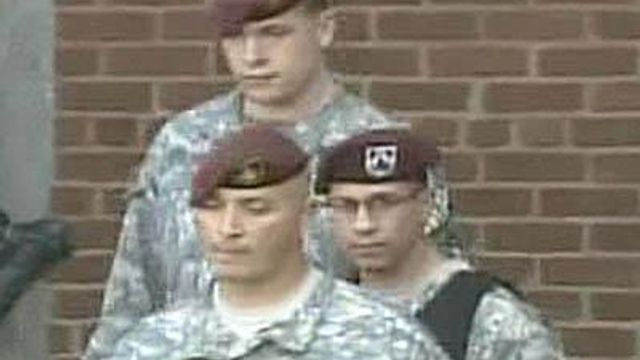'Fragging' trial begins at Fort Bragg
Military prosecutors argued Wednesday that the first soldier accusing of killing a direct superior in Iraq told other soldiers he wanted to kill and burn his National Guard officer.
Posted — UpdatedProsecutor Capt. Evan Seamone told jurors that Staff Sgt. Alberto B. Martinez was frustrated with Capt. Phillip Esposito's strict oversight of the supply room where Martinez worked. Martinez, a New York National Guard soldier, told another soldier he planned to "frag that (expletive)" before a suspicious blast tore through Esposito's living quarters, the prosecutor said during opening arguments of Martinez's death penalty trial.
Esposito and 1st Lt. Louis Allen, also a National Guard officer, were killed when a mine detonated outside their room in 2005.
"This was almost the perfect murder," Seamone said in his 90-minute opening statement.
Martinez, 41, of Troy, N.Y., is accused of planting the anti-personnel mine that detonated on June 7, 2005, in a window just outside the officers' room at Saddam Hussein's Water Palace in Tikrit. The officers, who were playing the board game Risk at the time of the attack, died the next day.
At an earlier hearing in Kuwait, a witness testified Martinez had said twice that he disliked Esposito and was going to "frag" him.
"These brutal killings didn't happen at the hands of an insurgent," Seamone said.
Relatives of Esposito and Allen were in the military courtroom Wednesday and wept as Seamone recounted the incident.
Defense attorney Maj. John Gregory refuted the prosecution's claims in his 90-minute opening statement, saying there was no concrete evidence linking Martinez to the killings. He also said Martinez was charged because of his feud with Esposito, a by-the-book West Point graduate who took over a relaxed National Guard unit.
"The investigation was so flawed and so unreliable it cannot be the basis of a conviction of Staff Sgt. Martinez," Gregory said.
The trial is expected to run through the end of the year, and Col. Steve Henley, the military judge handling the case, has pledged to hear testimony on holidays and weekends. However, Henley said the proceedings would end early Wednesday and Thursday because one of the 14-member panel hearing the case had a personal matter.
Bringing Martinez to trial has been an arduous process, as defense attorneys spent countless hours trying to eliminate a possible death sentence. They won postponements, but failed to escape a capital trial.
The numerous delays frustrated the widows of Esposito and Allen, but they said Wednesday they were glad the trial had finally started.
"It was a nice change to finally hear in open court the name put to the crime. We haven't heard that before. There's been a lot of tiptoeing around and sensitivity about it," Barbara Allen said.
The Army reported hundreds of "fragging" incidents between 1969 and 1971, but only four soldiers have been court-martialed or charged with killing a fellow soldier since the Iraq war began in 2003.
"From a military perspective this is a unique case, a soldier attempting to 'frag' his own officers," said Greg Rinckey, an Albany, N.Y., attorney who served as an Army lawyer for six years. "It's a troubling case from a military perspective because it goes to the concept of good order and discipline. This is why the military is seeking the death penalty."
Esposito, 30, of Suffern, N.Y., worked as an information technology manager in Manhattan and was Martinez's company commander. Allen, 34, of Milford, Pa., was a high school science teacher and the company operations officer. The Espositos had a young daughter, and the Allens had four young sons.
The court-martial is taking place at the sprawling North Carolina base because it's where the commander in charge of ground forces in Iraq at the time of the blast was based. The Army has set up a closed-circuit television feed at West Point in New York, but Allen and Esposito's widows are spending thousands to rent apartments and attend the trial in person.
"We would rather be back with our children than be here in the courtroom, but we're here seeking justice for our husbands," Siobhan Esposito said.
"If there's appeals for 10 years, 20 years, 30 years, we will be there," Allen said.
• Credits
Copyright 2024 by WRAL.com and the Associated Press. All rights reserved. This material may not be published, broadcast, rewritten or redistributed.





